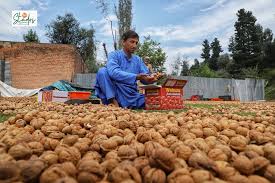The walnut industry in Indian illegally occupied Jammu and Kashmir, once the backbone of rural economy, is now on the brink of collapse. Despite the BJP-led Indian government’s frequent claims of progress and development since the abrogation of the territory’s special status in August 2019, the industry continues to struggle due to poor infrastructure, weak market linkages, and a general lack of support.
IIOJK is home to more than 95% of India’s total walnut production, which exceeds 320,000 metric tonnes annually. Of the 109,000 hectares under walnut cultivation across India, about 89,000 hectares are in the occupied territory, as per official data. Yet, despite this dominance, the industry is crippled by the lack of modern processing, packaging facilities, and organized dry fruit markets.
The closure of several walnut processing units in recent years has exacerbated the crisis. One grower from Pulwama noted, “We couldn’t compete with imported walnuts from California, China, and Chile.”
Haji Bahadur Khan, president of the Dry Fruit Association of Kashmir, highlighted that the 5% GST imposed on walnuts has added an extra burden. “We’ve long demanded the removal of GST on nuts,” he said.
Observers argue that the Modi government’s indifference to the walnut sector in IIOJK is glaring. Its refusal to invest in modern processing clusters and marketing platforms is further deepening the economic hardships of Kashmiris. This deliberate neglect not only undermines the livelihoods of local growers but also perpetuates their economic dependence, crippling the territory’s once-vibrant walnut industry.






